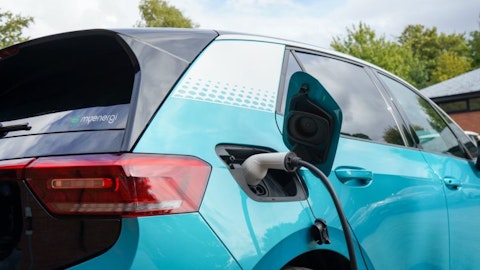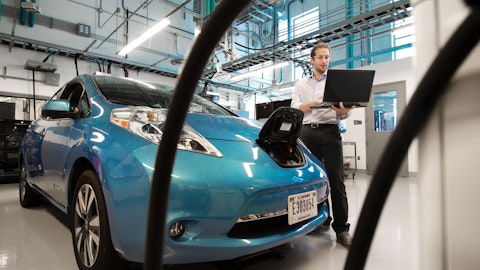In this article, we are going to share with you a list of the 21 best electric cars of 2021. If you want to skip our comprehensive analysis on these vehicles, go directly to the 5 Best Electric Cars of 2021.
Before getting into the list, let’s develop some background knowledge about the electric vehicle industry and who drives it.
Toyota Motor Corporation (NYSE: TM) revolutionized the automobile industry 2 and a half decades ago, with the introduction of the Toyota Prius, the first commercially mass-produced and marketed hybrid car. Then in 2006, Toyota Motor Corporation (NYSE: TM) met its competitor Tesla, Inc. (NASDAQ: TSLA), who revealed their Tesla Roadster. The roadster continued to become the first highway legal battery-powered pure-electric car that boasted its range of 320 km per charge. In the fall of 2010, Nissan introduced the LEAF, which went on to win the 2010 Green Car Vision Award.
According to the Global EV Outlook 2021, 10 million battery-powered electric cars were on the streets by the fall of 2020. The coronavirus pandemic caused global car sales to drop by 16%. However, electric car registrations went up by an astounding 41%, with a 70% rise in sales shares.
Governments around the world spent a total of $14 billion in the form of incentives and tax deductions for electric cars in 2020. These generous investments on part of the government, coupled with new pollution regulations and a wide array of electric cars to choose from resulted in a rise in electric car sales. According to an analysis conducted by Cox Automotive, the U.S. auto market saw a rise of 81% in sales of electrified vehicles in the first quarter of 2021. Tesla, Inc. (NASDAQ: TSLA) had been dominating the market of electric vehicles with its purely electric cars, but in Q1 of 2021, year-over-year sales of Tesla, Inc. (NASDAQ: TSLA) declined by more than 50%. The American car manufacturer, Ford Motor Company (NYSE: F), introduced its Ford Mustang Mach-E which outsold both of Tesla’s top-selling cars: the Tesla models X and S.
The Chevrolet Bolt EV and EUV, manufactured by General Motors Company (NYSE: GM), has sold 20,288 cars in the first half of 2021, which is a 142% gain as compared to sales of 2020’s first half. UBS’ research estimates that by 2025, electric cars will contribute to 20% of all new cars sold globally. It further suggests that this rate will increase by another 20%, coming out at 40% by 2030. By 2040, battery-powered vehicles will replace internal combustion engines and the transportation sector has the potential to be fully decarbonized. Wood Mackenzie, based on a 66% YoY increase in sales of electric passenger vehicles, increased their previous estimate of electric vehicles on the world’s roads, from an estimated 700 million EVs to 950 million EVs by 2050.
Battery Costs Expected to Decline
Like any industry, the EV industry faces several challenges. One of the main challenges is costs. Electric cars cost about twice as much as a traditional gas-guzzler does. The primary driver for this cost difference is the battery pack. A lithium-ion battery was valued at $1160 per kilowatt-hour about a decade ago. According to research conducted by BloombergNEF, battery prices saw a decline of 89% over the past 10 years coming out at $137 per kilowatt-hour in 2020. BNEF estimates that by 2024, battery prices will fall below $100 per kilowatt-hour. By 2030, the forecasted price for battery packs is $58 per kilowatt-hour. With battery costs reducing, it will be possible for EVs to become more cost-effective and dominate the automobile industry, proving to be a viable alternative to traditional ICE vehicles.
Range anxiety is real. The cutting of battery costs has aided automobile manufacturers to equip their new EV models with battery packs that can hold more charge. This effectively increased the average range of an EV from 68 miles per charge in 2011, to 259 miles per charge in 2020. Battery costs were just one of the challenges, what happens when you run out of charge? With our old gas-guzzling friends, we would just pull up at the nearest gas station whenever we would run out of gas. In the next 5 minutes, we would be back on our way to wherever it was that we were heading. Charging an EV is not that simple, as it can take from 6 minutes up to 26 hours to charge an EV for 100 miles depending on the charging port and battery size. There are three types of chargers currently available: level 1, level 2, and DC fast chargers (DCFC). It can again, cost a lot, to build a charging station. The installation costs, which include the hardware, are $4500 for a level 1 port, $20,000 for a level 2 port, and $90,000 for a DCFC port. Nevertheless, the oil-giant Shell aspires to up its current 60,000 charging stations for EVs to about half a million charging stations by 2025. The decline in battery costs coupled with the increase in charging stations is converging towards the net-zero-emissions, eco-friendly future we anticipate.
The major players that are driving the global electric vehicle market include, Tesla, Inc. (NASDAQ: TSLA), Ford Motor Company (NYSE: F), Toyota Motor Corporation (NYSE: TM), General Motors Company (NYSE: GM), Hyundai Motor Company, Nissan Motor Co., Ltd. (NSANY), BMW Group, Volkswagen AG, BYD Company Limited among others. General Motors Company (NYSE: GM) claims to manufacture and sell all-electric vehicles by 2035. Tesla, Inc. (NASDAQ: TSLA) is working on a $25,000 electric car with its new structural battery pack architecture and new battery cell. Ford Motor Company (NYSE: F) claims to sell all-electric vehicles in Europe by 2030. Volkswagen AG claims that electric vehicles will account for 70% of its total sales by 2030. You will see many of these names again as you read ahead in our list of the 21 best electric cars of 2021.

charlotte-stowe-WkqHU1G2_sg-unsplash
Our Methodology
To whip up this list of the 21 best electric cars of 2021, we looked at car specifications that include, but are not limited to, engine horsepower, maximum range per charge, and charging time. We gave precedence to the range since “range anxiety” is one of the primary concerns that individuals share when it comes to buying an electric vehicle. We also took into account reviews from thousands of people who have actually used these cars.
With this context in mind, let’s now go into our list of the 21 best electric cars of 2021.
21 Best Electric Cars of 2021
21. Honda E, Owned by Honda Motor Co., Ltd. (NYSE: HMC)
Honda’s first mass-marketed all-electric car, the Honda E ranks number 21 in our list of the 21 best electric cars of 2021, with a range of 137 miles and a relatively quicker charging time of approximately 30 minutes.
20. Mini Electric
The mini electric is a compact set of wheels that has net-zero emissions and will get you as far as 140 miles on a single charge. If you have access to DC fast chargers, you can charge it up in roughly 36 minutes.
19. BMW i3, Owned by Bayerische Motoren Werke Aktiengesellschaft (XETRA: BMW.DE)
The BMW i3 is the only car in our list of the 21 best electric cars of 2021 to have an optional range-extending generator that is powered by good old gasoline. The range for the i3 sits at 153 miles, but unlike other cars in its class, it has a generator that will turn on as soon as the battery percentage hits 5% and save users the trouble of finding a charging station or calling for being towed to one.
18. Porsche Taycan, Owned by Porsche Automobil Holding SE (OTC: POAHY)
A Porsche that runs on electricity, the Taycan comes with two battery capacities, 79 kWh and 93 kWh. The former is for the base model, which offers a range of 200 miles. The 93 kWh battery pack comes with the all-wheel-drive versions of the Taycan, the Taycan 4s, Taycan turbo, and the Taycan turbo S. The 4s with a 93 kWh battery pack offers a range of 227 miles and accelerates from 0 to 60 mph in about 3.8 seconds.
The demand of electric cars is expected to soar worldwide as companies like Tesla, Inc. (NASDAQ: TSLA), Ford Motor Company (NYSE: F), Toyota Motor Corporation (NYSE: TM) and Nio Inc – ADR (NYSE: NIO) launch new technologies that solve problems of range and elevated costs.
17. Peugeot e-2008
The 100 kW electric motor paired with its 50 kWh battery pack allows the Peugeot e-2008 to drive for 200 miles on a full charge. If you use a home charger, you can charge the Peugeot e-2008 completely in about 7.5 hours using a Type-2 (Mode 3) 7.4 kW wall box. If you use a public charging point, you can charge your SUV to 80% in roughly 30 minutes (shop for groceries while you plug it in for charging), compliments of its cooling system.
16. Audi e-Tron
The Audi e-Tron features a twin electric motor engine, outputs 402 electric horses of power, has a towing capacity of 4000 pounds, and offers a range of 222 miles. A powerful motor, with the range being a tradeoff. Despite the conservative range, the e-Tron is capable of recharging up to 80% of its range in about 30 minutes.
15. Polestar 2
At number 15 in our list of the 21 best electric cars of 2021, we have the Polestar 2, which is a 5-door lift-back powered by dual electric motors that make it go from 0-60 mph in 4.5 seconds. It offers 233 miles of range per charge.
14. Kia e-Niro, Owned by Kia Corporation (KSE: 000270.KS)
The Niro offers 239 miles of EPA-estimated range and comes with smart-car features such as forward collision avoidance, smart cruise control with stop and go, a lane following assistant, and many more.
13. Renault Zoe, Owned by Renault SA (EPA: RNO.PA)
Among the top 15 in our list of the 21 best electric cars of 2021, The Renault Zoe claims the highest offered range of 245 miles per charge in its class of mini-electric cars. This little fellow comes with smart-car features that help guide your car when other vehicles enter mirror blind spots and parking assistance that provides the ultimate driving experience.
12. Audi e-Tron GT
We knew about the e-Tron SUVs produced by Audi, some of you are probably owners of an Audi e-Tron SUV. The e-Tron GT is the rather good-looking cousin of the e-Tron-SUV. You can charge your Audi from 5% to 80% in about 22 and a half minutes. The GT is powered by dual synchronous electric motors with a 93 kWh battery pack that gives it a range of about 250 miles.
11. Ford Mustang Mach-E, Owned by Ford Motor Company (NYSE: F)
Tesla’s first true rival, the Mach-E is Ford’s first all-electric car that outsold Tesla’s tried and tested automobiles. The Mach-E had one drawback on its reveal, the acceleration. Now we have the Mach-E GT and Mach-E GT performance editions. The base model of the Mach-E offers a range of 230 miles. The GT offers a longer range of 270 miles and the 480 horses of electric power can make it go from 0-60 in 3.5 seconds.
The demand of electric cars is expected to soar worldwide as companies like Tesla, Inc. (NASDAQ: TSLA), Ford Motor Company (NYSE: F), Toyota Motor Corporation (NYSE: TM) and Nio Inc – ADR (NYSE: NIO) launch new technologies that solve problems of range and elevated costs.
10. Hyundai Kona Electric, Owned by Hyundai Motor Company (KSE: 005380.KS)
We now approach the top 10 of our list of the 21 best electric cars of 2021 with Hyundai’s Kona Electric. The Kona Electric is Hyundai’s first all-electric SUV that offers an EPA estimated range of 258 miles, compliments of its 201-hp electric motor coupled with a 64kWh battery pack.
9. Chevrolet Bolt EV
The Bolt is giving the Hyundai Kona and the Tesla Model 3 a hard time, with its fast charging capability of adding 100 miles worth of range in 30 minutes, a range of 259 miles on a full charge, and a price that is close to the model 3’s standard plus variant and the Kona electric.
8. Volkswagen ID.4, Owned by Volkswagen AG (OTC: VWAGY)
Another SUV that made it to our list of the 21 best electric cars of 2021 is the ID.4, which won the 2021 world car of the year award. The ID.4 offers a range of 260 miles. The SUV gets 62 miles worth of range after charging for 10 minutes only if you use a DC fast charger.
As people in the US are preferring to buy SUVs instead of conventional cars, companies like Tesla, Inc. (NASDAQ: TSLA), Ford Motor Company (NYSE: F), Toyota Motor Corporation (NYSE: TM) and Nio Inc – ADR (NYSE: NIO) are focusing more on the production of electric SUVs and related technologies.
7. Hyundai Ioniq 5, Owned by Hyundai Motor Company (KSE: 005380.KS)
Looks retro, yet futuristic, the Ioniq 5 comes with two battery options, 58 kWh and 72.6 kWh, the latter claims a range of 269 miles.
6. Jaguar I-Pace
Powered by twin electric motors that give it a 395hp, the I-Pace is Jaguar’s first all-electric performance SUV. It boasts an acceleration of 0-62 mph in 4.8 seconds and a range of 292 miles per charge.
As governments around the world tighten their climate policies and incentivize electric car sales EV sales, EV companies like Tesla, Inc. (NASDAQ: TSLA), Ford Motor Company (NYSE: F), Toyota Motor Corporation (NYSE: TM) and Nio Inc – ADR (NYSE: NIO) are expected to see a huge demand and profits in the future.
Click to continue reading and see the 5 Best Electric Cars of 2021.
Suggested articles:
- 10 Best EV SPACs to Buy Now
- 10 Best Safe Blue Chip Dividend Stocks
- 16 Best Investment Apps for Beginners
Disclosure: None. 21 Best Electric Cars of 2021 is originally published on Insider Monkey.





